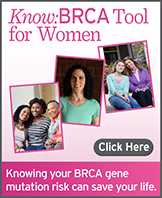Family Health History and the BRCA1 and BRCA2 genes

Breast and ovarian cancers that run in families can be caused by genetic changes, or mutations, most commonly in the BRCA1 and BRCA2 genes. You can use the Know:BRCA tool to collect your family health history information, assess your risk for BRCA mutations, and share this information with your doctor. Your personal and family health history information can help your doctor decide whether to refer you for genetic counseling to find out if genetic testing might be right for you. It’s important to know that not everyone who inherits a BRCA1 or BRCA2 mutation will get breast or ovarian cancer. Also, not all inherited forms of breast or ovarian cancer are due to mutations in the BRCA1 and BRCA2 genes.
Can men get breast cancer? Men and BRCA-related cancers
Although breast cancer is much more common in women, men with BRCA1 or BRCA2 mutations are more likely to get breast cancer than other men. In addition, men with BRCA mutations are more likely to get high grade prostate cancer. Both men and women with BRCA mutations are more likely to get pancreatic cancer.
You can inherit BRCA1, BRCA2, and other mutations from your mother or your father, so be sure to include information from both sides of your family when collecting your family health history. Include information on your parents, sisters, brothers, children, grandparents, aunts, uncles, nieces, nephews, and grandchildren. Include information about your ancestry, if you know it. BRCA1 and BRCA2 mutations are more common in people with Ashkenazi Jewish or Eastern European ancestry. Tell your doctor if you are concerned about your family health history, especially if you or your close relatives have or had any of the following:
- Breast cancer, especially at a younger age (age 50 or younger)
- Ovarian, peritoneal or fallopian tube cancer
- Triple negative breast cancer (Triple negative cancers are a type of breast cancer that lack estrogen receptors, progesterone receptors, and human epidermal growth factor receptor 2)
- Cancer in both breasts
- Breast cancer in a male relative
- Multiple cancers in the family, including breast, high grade prostate, or pancreatic cancer
- Ashkenazi Jewish or Eastern European ancestry
- A known BRCA1 or BRCA2 mutation in the family
If Your Family Health History of Breast Cancer is Average or Moderate Risk
Most women with a family health history of breast cancer don’t need genetic counseling for breast and ovarian cancer. Most women have family health histories that mean they are at average risk. Some women with breast cancer in their families will have a moderate risk.
If your family health history of breast cancer is average or moderate risk, you probably won’t need genetic counseling and testing for hereditary breast and ovarian cancer. One exception is if you have a moderate risk family health history and Ashkenazi Jewish or Eastern European ancestry. BRCA1 and BRCA2 mutations are more common in women of Ashkenazi Jewish or Eastern European ancestry. This means that women of Ashkenazi Jewish or Eastern European ancestry are more likely to have a BRCA1 or BRCA2 mutation than women of other ancestries with similar family health histories. Thus, a family health history that would be considered moderate risk for most women might be considered strong risk for you because of your Ashkenazi Jewish or Eastern European ancestry.
Even if your doctor doesn’t recommend genetic testing and counseling, your family health history of breast cancer can affect when you start mammography screening. If you are a woman with a parent, sibling, or child with breast cancer, you are at higher risk for breast cancer. Based on current recommendations, you should consider talking to your doctor about starting mammography screening in your 40s.
If your Family Health History of Breast or Ovarian Cancer is Strong Risk
If you are a woman with a strong risk family health history, you are more likely to have a mutation in BRCA1 or BRCA2 than women with average or moderate risk family health histories. Thus, you are more likely to benefit from genetic counseling and testing for mutations in BRCA1 and BRCA2. To learn more about risk for breast or ovarian cancer based on family health history, see family health history risk categories.
If You Have a Personal History of Breast or Ovarian Cancer
If you have a personal history of ovarian, fallopian tube, or primary peritoneal cancer, some current guidelines recommend that you have genetic counseling and testing. If you have a personal history of breast cancer, genetic counseling and testing may or may not be recommended for you, depending on your age of diagnosis, type of breast cancer, presence of certain other cancers or cancer in both breasts, ancestry, and family health history of breast, ovarian, and other cancers.
Learn more about genetic counseling for hereditary breast and ovarian cancer.
The BRCA1 and BRCA2 genes
The breast cancer 1 (BRCA1) and breast cancer 2 (BRCA2) genes are the genes most commonly affected in hereditary breast and ovarian cancer. Normally, the BRCA1 and BRCA2 genes protect you from getting certain cancers. But certain mutations in the BRCA1 and BRCA2 genes prevent them from working properly, so that if you inherit one of these mutations, you are more likely to get breast, ovarian, and other cancers. You and your family members are more likely to have a BRCA1 or BRCA2 mutation if your family has a strong history of breast or ovarian cancer. Because BRCA1 and BRCA2 mutations are inherited, family members with BRCA1 or BRCA2 mutations usually share the same mutation.
- Page last reviewed: July 29, 2016
- Page last updated: July 29, 2016
- Content source:


 ShareCompartir
ShareCompartir